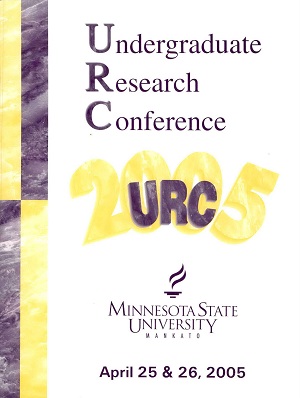Cross-Cultural Comparison of the Relationship Between Self-Enhancement and Attributions
Location
CSU 201
Start Date
25-4-2005 8:30 AM
End Date
25-4-2005 10:00 AM
Student's Major
Psychology
Student's College
Social and Behavioral Sciences
Mentor's Name
Vinai Norasakkunkit
Mentor's Department
Psychology
Mentor's College
Social and Behavioral Sciences
Description
The tendency to externalize failure and internalize success is the core of attributional bias, otherwise known as the "self-serving bias" (Nisbet and Ross,1980). Evidence suggests that this attributional style is predominant in the West among non-depressed populations. In contrast, Wan and Bond (1982) found that for Chinese subjects in China, the attributional pattern was reversed. Previous evidence also suggests that self-serving biases are congruent with self-enhancing motives in the West (Heine, et al., 1999). Self-enhancement is the "tendency to maintain and enhance the overall evaluation of the self (Kitayama, et al., 1997). While self-enhancing tendencies can be found across various domains in the west, this tendency is conspicuously absent among subjects in East Asian cultures (Heine, et al., 1999). Since self-enhancing motives are strong in the west, this motive should influence attributional style, resulting in a strong positive correlation between selfenhancement and attributional style among American subjects. However, with a lack of evidence for self-enhancing motives in the East, it is reasonable not to expect any strong relationship between self-enhancement and attributional'style among Chinese. This study explored the relationship between attributional style and self-enhancement among Chinese students in China and American students in the United States. It is expected that the relationship between attributional style and selfenhancement will be significantly stronger among American students. Chinese and American participants completed the False Uniqueness Questionnaire (FUQ) and the Attribution Styles Questionnaire (ASQ). Analytical strategy will involve comparing the magnitudes of correlational results between self-enhancement and attributional style scores across cultural groups.
Cross-Cultural Comparison of the Relationship Between Self-Enhancement and Attributions
CSU 201
The tendency to externalize failure and internalize success is the core of attributional bias, otherwise known as the "self-serving bias" (Nisbet and Ross,1980). Evidence suggests that this attributional style is predominant in the West among non-depressed populations. In contrast, Wan and Bond (1982) found that for Chinese subjects in China, the attributional pattern was reversed. Previous evidence also suggests that self-serving biases are congruent with self-enhancing motives in the West (Heine, et al., 1999). Self-enhancement is the "tendency to maintain and enhance the overall evaluation of the self (Kitayama, et al., 1997). While self-enhancing tendencies can be found across various domains in the west, this tendency is conspicuously absent among subjects in East Asian cultures (Heine, et al., 1999). Since self-enhancing motives are strong in the west, this motive should influence attributional style, resulting in a strong positive correlation between selfenhancement and attributional style among American subjects. However, with a lack of evidence for self-enhancing motives in the East, it is reasonable not to expect any strong relationship between self-enhancement and attributional'style among Chinese. This study explored the relationship between attributional style and self-enhancement among Chinese students in China and American students in the United States. It is expected that the relationship between attributional style and selfenhancement will be significantly stronger among American students. Chinese and American participants completed the False Uniqueness Questionnaire (FUQ) and the Attribution Styles Questionnaire (ASQ). Analytical strategy will involve comparing the magnitudes of correlational results between self-enhancement and attributional style scores across cultural groups.
Recommended Citation
Kirkland, Jennifer. "Cross-Cultural Comparison of the Relationship Between Self-Enhancement and Attributions." Undergraduate Research Symposium, Mankato, MN, April 25, 2005.
https://cornerstone.lib.mnsu.edu/urs/2005/oral-session-A/4




